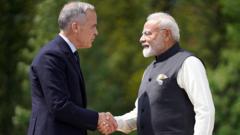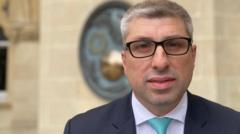Can India and Canada Repair Relations with New Diplomats?

Published: 2025-08-29 07:01:04 | Category: world
India and Canada have appointed new high commissioners to each other's countries, marking a significant step towards restoring diplomatic relations that were strained following the murder of Sikh separatist leader Hardeep Singh Nijjar in 2023. This mutual appointment aims to rebuild trust and foster collaboration between the two nations.
Last updated: 06 October 2023 (BST)
Key Takeaways
- New high commissioners have been appointed by both India and Canada to mend diplomatic relations.
- The killing of Hardeep Singh Nijjar in June 2023 was a catalyst for diplomatic tensions.
- Former Prime Minister Justin Trudeau made allegations connecting Indian agents to Nijjar's death.
- India's new envoy, Dinesh K Patnaik, is expected to take up his role shortly in Canada.
- Canada's Christopher Cooter will serve as the new envoy in New Delhi.
Background of the Diplomatic Strain
The relationship between India and Canada has historically been cordial, but it experienced unprecedented strain in 2023. The tensions escalated after the murder of Hardeep Singh Nijjar, a Sikh separatist leader, who was shot outside a Sikh temple in Vancouver in June. Nijjar was designated a terrorist by the Indian government in 2020 due to his involvement in advocating for the Khalistan movement, which seeks an independent Sikh homeland.
In October 2023, the situation further deteriorated when Canada expelled India’s high commissioner, citing links between Indian diplomats and Nijjar's murder. India, however, maintained that their envoy was withdrawn as part of a response to Canada's actions. This tit-for-tat expulsion marked a significant low in diplomatic relations between the two nations.
Recent Developments
Following a period of heightened tensions, there have been signs of thawing relations. In June, Prime Minister Narendra Modi of India met with Mark Carney, the successor to Justin Trudeau, during his visit to Canada. The two leaders discussed the importance of restoring diplomatic channels and agreed on reinstating senior diplomats, paving the way for improved interaction.
In the latest development, Canada has appointed Christopher Cooter as its new high commissioner to India. Meanwhile, India has chosen Dinesh K Patnaik, the current ambassador to Spain, to take up the position in Canada. Canadian Foreign Minister Anita Anand described Cooter's appointment as part of a “step-by-step approach to deepening diplomatic engagement” with India.
The Khalistan Movement and Its Impact
The Khalistan movement has been a contentious issue in India-Canada relations. The movement advocates for an independent Sikh state, which has been a source of concern for the Indian government. India has accused Canada of allowing pro-Khalistan groups to operate within its borders, exacerbating bilateral tensions.
With approximately 770,000 Sikhs residing in Canada, the country has the largest Sikh diaspora outside of Punjab. This community is often seen as a critical link between India and Canada, yet their involvement in separatist movements complicates diplomatic relations. India's government has consistently urged Canada to take a firmer stance against pro-Khalistan activities, arguing that such groups pose a threat to India's sovereignty.
What Happens Next?
The appointments of Cooter and Patnaik signal a willingness on both sides to address the underlying issues that have strained their relationship. The coming months will be crucial in determining whether these diplomatic changes translate into meaningful dialogue and cooperation.
Both nations will need to navigate the sensitive territory surrounding the Khalistan movement while fostering a more robust partnership in trade, culture, and security. The reinstatement of senior diplomats is a positive step, but the effectiveness of these appointments will depend on how both governments manage their domestic and international obligations.
Conclusion
As India and Canada each take steps to restore diplomatic relations, the focus will be on rebuilding trust and addressing the contentious issues that have strained ties in recent years. The success of these new appointments may hinge on both nations' ability to engage in constructive dialogue and find common ground on sensitive topics such as the Khalistan movement.
In a world where international relationships can shift rapidly, the future of India-Canada relations remains to be seen. Will this new chapter lead to lasting collaboration, or will historical tensions resurface? Only time will tell. #IndiaCanadaRelations #DiplomaticEngagement #KhalistanMovement
FAQs
What caused the diplomatic strain between India and Canada?
The diplomatic strain was primarily caused by the murder of Sikh separatist leader Hardeep Singh Nijjar in June 2023 and subsequent allegations linking Indian government agents to his death.
Who are the newly appointed high commissioners?
India has appointed Dinesh K Patnaik as its high commissioner to Canada, while Canada has named Christopher Cooter as its new envoy to India.
What is the Khalistan movement?
The Khalistan movement advocates for an independent Sikh state in India, and it has been a significant point of contention between India and Canada, especially concerning the activities of diaspora groups.
How many Sikhs live in Canada?
Approximately 770,000 Sikhs reside in Canada, making it home to the largest Sikh diaspora outside of India.
What are the next steps for India and Canada?
The next steps involve rebuilding trust through diplomatic engagement, addressing contentious issues, and fostering cooperation in various sectors, including trade and security.



